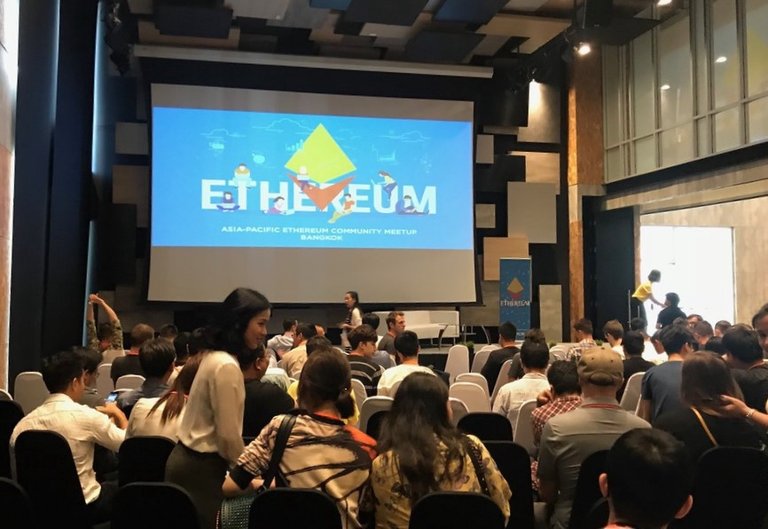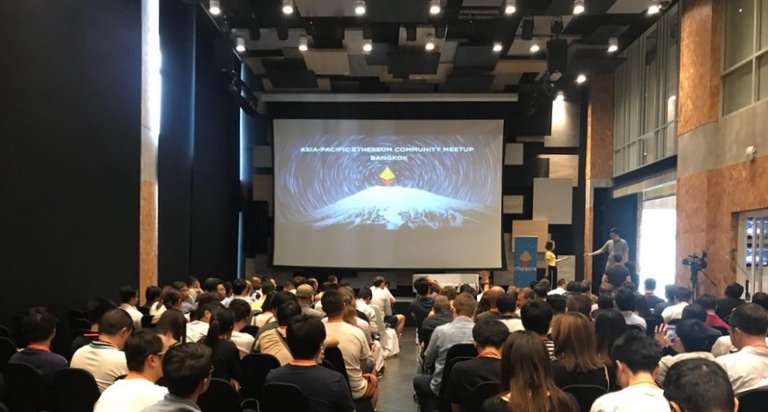
JP and Kelsie flew to Thailand on Friday to take part in the Asia-Pacific Ethereum Meet up. The trip itself was a whirlwind; both of the ideas presented and our compressed schedule. However it was incredibly beneficial gathering, where CanYa was able to share our progress and hear ideas with the inner circle of Ethereum. Here are some of the insights that we came away with.

More than anything the biggest take-away from this event, was how community focused the Ethereum network genuinely is. Despite the fact that many of the projects presenting (which of course included ethereum itself) are some of the biggest tokens in the world, the mood of the gathering was focused, open and collaborative.
The second take-away was just how wide the interest in the event, and by extension the blockchain talent in this part of the world. This was obvious as the event drew a truly international audience for a meet up that was specifically focused on the developments of the Asia-Pacific region.
Even though this is the third point, and it almost goes without saying, but it’s always humbling to be reminded of the genuine talent in the ethereum community. We heard from the ethereum core team as they spoke about supporting the development of scalable dapps with the Casper and Sharding initiatives, which is something incredibly relevant to CanYa. Its remarkable how quickly the platform is evolving and improving to deal with these issues of scalability moving forward.
The keynote speech was of course done by Vitalik, and he spoke about how some of the cryptoeconomic ideas used to build blockchains, could also be applied to make the internet “less broken.”

What I assumed is meant by this has to do with the decentralised principles of blockchain technology, which reduces the ability for bad actors to manipulate a system. When the Internet was built, it was of course done so in a centralised way. This meant that things like data were exchanged, stored and ultimately monetised by companies such as Google, Facebook and Amazon without the consent or knowledge of the people that the data belongs to.
However, the implications of data control are far more perverse than loss of privacy. This is because having the data is one thing, but being able to release the potential of this data in the form of predictive analysis is quite another. Predictive analytics is an area of statistics that deals with extracting information from data and using it to predict trends and behavioral patterns. Predictive analysis is already the lifeblood of many industries such as advertising, fraud detection, and credit lending. The danger lies in the fact that the more data collected allows for a more specific predictive analysis and more accurate surveillance. An Orwellian prophecy.
An interesting project that was not brought up by name at this meetup, but is relevant to this discussion is Augur. Augur is a prediction market platform, built on the Ethereum platform, which rewards the user for correctly predicting future events. Rather than raw data, this platform relies on the scientific principle known as the wisdom of the crowd. This states that if you ask enough people to answer a certain question, their average answer is far more accurate than any expert. The cleverest person is no match for the collective brain, which is why centralisation of governance does not work.
Imagine being able to Google questions about things that haven’t happened yet, and getting accurate odds of their occurrence. This is what Augur is proposing, however instead of just getting the information voluntarily, Augur rewards the people financially that accurately predict future events. This means that the user is in control of their own data, and is rewarded for it its use (if they allow it be used).
If the Internet were to be redesigned with decentralised principles (which is a constantly discussed topic) all data would be private. This would make the technology far less invasive (as a start). Ethereum co-founder Joseph Lubin is attempting to do just this. Using the Ethereum platform he is attempting to build a decentralised web 3.0 called Consensys.
Also in attendance was Omisego (OMG) and the Ethereum Community Fund. In a first of its kind, half a dozen ICO companies came together to create the fund that plans to pay out more than $100 million to promising projects in the Ethereum crypto space.
This above all else represents the values and ideals of a community that is learning and evolving through collaboration. The CanYa team believes in collective intelligence, and by extension could not hope to be a part of a greater collective than the Ethereum network.
For all the latest news and updates follow us here:
Canya Sites/Social:
Telegram Announcements: https://t.me/canyacoin
Telegram Community: https://t.me/CanYaCommunity
Website: https://canya.io
Twitter: https://twitter.com/canyacoin
LinkedIn: https://au.linkedin.com/company/canya
Facebook: https://www.facebook.com/CanYaCoin/
CanYa Discord Community Channel: [https://goo.gl/umNpyb]

Hi! I am a robot. I just upvoted you! I found similar content that readers might be interested in:
https://medium.com/@diondaltonbridges/canya-heads-to-ethereum-asia-pacific-meetup-what-we-learned-25946255f26c
Coins mentioned in post: